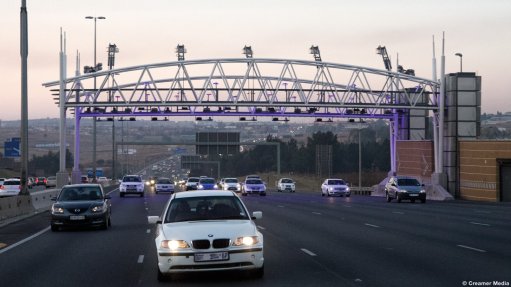
The South African National Roads Agency Limited (Sanral) is satisfied with registrations and payments made by nonregistered Gauteng e-toll road users, Sanral financial officer Inge Mulder said in a statement on Thursday.
The statement was sent out by Sanral after Transport Minister Dipuo Peters on Tuesday revealed that as of March 1, R543-million in Gauteng Freeway Improvement Project e-toll invoices had been transferred to Sanral’s Violations Processing Centre (VPC), with only R50-million, or 9.21%, of this having been paid.
Sanral confirmed that these figures were accurate, stating that it was true that only about 9% of nonregistered road users paid their debt after the seven-day grace period had expired. However, the roads agency added that it was important to note that compliance of nonregistered users before the seven-day grace period expired stood at 35%.
Meanwhile, Sanral also pointed out that it had 1.2-million registered e-tag users, with R250.8-million having been collected from them during February.
“We have always trusted that the public will do the right thing and pay. This high level of compliance has also meant that we are on track to meet our debt obligations,” Mulder said.
Meanwhile, the Opposition to Urban Tolling Alliance (Outa) on Tuesday said it was not surprised by the low amount of payments received by Sanral’s VPC, stating that this confirmed the organisation’s opinion that the “e-toll debacle is extremely inefficient and a farce of the highest proportions”.
Outa chairperson Wayne Duvenage also told Engineering News Online that the amount stated by the Minister as outstanding “appears to be very low, as these values in the VPC process are [supposed to be] around six times [higher than] the e-tagged values”.
However, Mulder said that the R543-million stated was the total amount invoiced to road users that had not paid within the seven-day grace period, excluding any discounts that could be eligible at the date of the report.
Further, Peters also said that, as at February 28, an amount of R54.7-million, excluding value-added tax, had been expended in the collection of the e-toll debt.
This amount included R32.8-million for postage and printing of invoices, which was required in terms of legislation, she said, adding that “the cost of debt collection processes is, therefore, R21.95-million, which is 4% of the [R543-million] revenue and 44% of cash generated in the VPC to date”.
Duvenage pointed out that these figures meant that more was being paid to collect the debt than was being received from the public.
“[This] confirms our views that e-tolling is the most inefficient farce one could ever imagine it to be and when one considers this result, we can only ask what more does the Minister need to call off the debacle, lest we continue to throw good taxpayers money after a bad policy decision,” he said.
Meanwhile, Justice Project South Africa (JPSA) on Thursday expressed its shock with regard to recent media reports that Sanral had decided to sentence persons with unpaid e-toll debt to jail time.
“Clearly whoever made this threat must have come to the realisation that previous threats of criminal records and credit blacklisting – based on an Act that exempts itself from the National Credit Act – have had a limited effect,” JPSA chairperson Howard Dembovsky said.
JPSA stated that it suspected that Sanral had now overplayed its hand and gone “a gantry too far” with its threats, and could well find that instead of managing to scare more people into compliance, they were simply strengthening the resolve of e-toll dissidents to resist, “since there is absolutely no way that the courts will willingly dismantle the Gauteng economy by jailing what, at the bare minimum, will be hundreds of thousands of economically active citizens – even if they could manage the volumes”.
Further, JPSA questioned a recent statement by Mulder in the media in which she said the country’s courts would easily cope with the volumes of e-toll prosecutions Sanral intended bringing at some time in the future, citing the “rollup” of offences into a single summons as her reasoning for this.
JPSA said while Sanral could indeed, through the clerk of the court, issue a single summons to an individual citing multiple counts of the same offence, it was not true that “bulk decisions” could be made.
“Each and every offender will have to be summonsed individually for their own matter and the normal criminal justice system and procedures will apply in line with the Constitution and the Criminal Procedure Act,” JPSA said.
Further, Dembovsky also said claims by Sanral that courts could process a large amount of these cases a day was “somewhat optimistic, given the current workload of the courts”.
JPSA had repeatedly stated that the South African criminal justice system, let alone the courts in Johannesburg, Tshwane and Ekurhuleni, could not deal with the volume of e-tolls prosecutions that would have to ensue at some stage or another and it maintained this stance, he said.